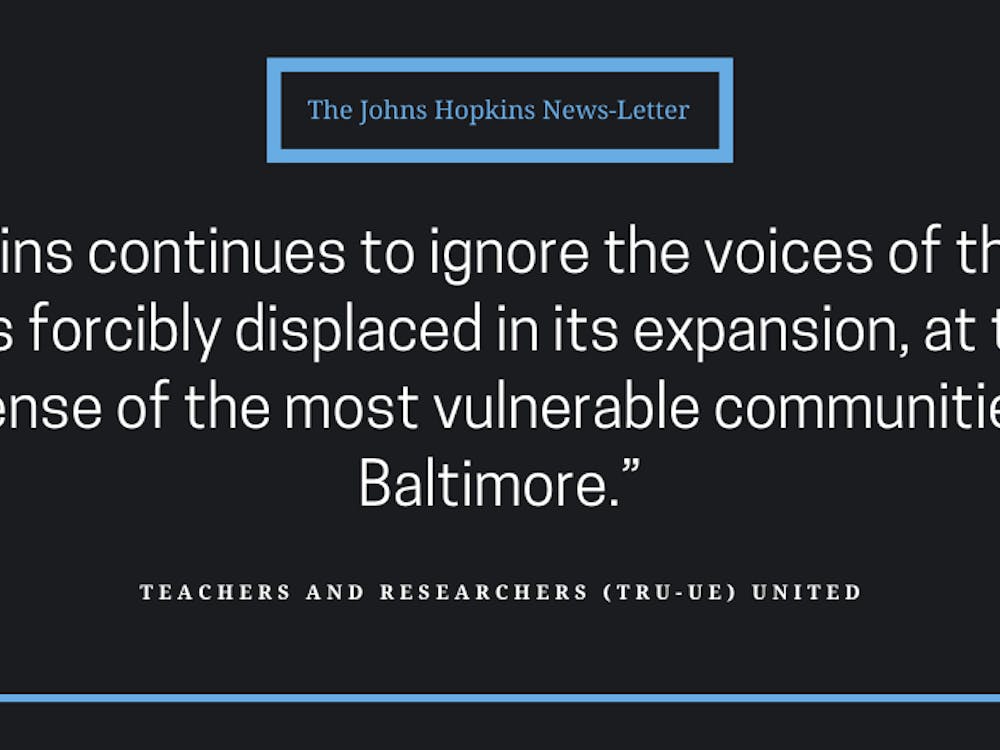The Bloomberg School of Public Health held a symposium this Monday, Sept. 12, on violence against LGBT+ populations.
Speakers included artist and activist Monica Yorkman; Executive Director of the Baltimore Transgender Alliance, Ava Pipitone; Daniel Webster, from the Johns Hopkins Center for Gun Policy and Research and Dr. Chris Beyrer from the Center for Public Health and Human Rights.
Almost every speaker mentioned the Orlando nightclub shooting that took place earlier this summer on June 12.
The shooting killed 49 people and is the deadliest in U.S. history. The attack, which targeted a gay nightclub, sparked a national conversation about gun violence and hate crimes against the LGBT+ community.
Yorkman stressed that hate crimes like the Orlando shooting are a daily occurrence.
“Orlando was a horrible tragedy. It was a holocaust. For a lot of us that holocaust is not an event; it is a reality.” Yorkman emphasized. “There is an Orlando happening somewhere in this country every day.”
Pipitone discussed the factors that leave the LGBT+ community vulnerable to such violence. The primary cause of this vulnerability is housing instability, which Pipitone said begins when LGBT+ teenagers struggle to find acceptance with their parents and are ultimately forced to leave their homes.
“In Baltimore city, 60 percent of people experiencing homelessness are LGBTQ,” Pipitone said. “That starts as soon as you’re kicked out of your parents’ house. And then when you look at the existing services in the city, they do not accommodate gender variance. They do not accommodate sexualities that are not heteronormative.”
This problem is then aggravated by the fact that the current public welfare system does not support gender variance, which leaves members of the LGBT+ population without the specialized support they need.
Yorkman also pointed out that the lack of proper housing leaves the LGBT+ population vulnerable and contributes to the hate crimes committed against them.
She noted that this trend was particularly relevant to transgender women of color, who face discrimination based not only on their gender identity but also because of the intersections with their race.
“Housing instability creates other problems for the LGBTQ community as well,” Yorkman said. “It impacts their employability and their ability to function socially.”
Both Yorkman and Pipitone also discussed the problem of “erasure.” While Orlando may have garnered national attention, they said, the daily violence and oppression experienced by members of the LGBT+ community is largely ignored or unknown by the general population.
One of the main themes Yorkman discussed was what she called her duty to discuss the truth about what life is like for a transgender woman of color like herself.
“Everything in the media says that we have no right to exist,” Yorkman said. “Everything in the media says that we have no right to a place to live. Everything in the media says that we have no right to even be in this conversation... that I don’t have the right to be an intellectual... that I have to be a prostitute, that I have to be a clown.”
Webster provided a different perspective, discussing the role that guns play in violence against LGBT+ communities.
Specifically, he analyzed the possibilities of an assault rifle ban and of handgun purchaser licensing, which would require more in-depth background checks for anyone looking to buy a handgun.
“The availability of guns in our society transforms hate into death,” Webster said. “We saw a pretty dramatic change when [the assault weapons ban] expired, basically a three-fold increase in the number of individuals who were shot, wounded or died in mass shootings.”
According the Webster, the rate of gun violence has increased three fold since the assault rifle ban was lifted in the United States.
He mentioned a study that compared Connecticut, which has handgun purchaser licensing laws, to Missouri, which does not, and found that Connecticut has less gun violence overall.
“I think we have evidence that risk-based firearm policies that increase accountability can lower violence,” Webster said. “It’s part of a solution to try to reduce the lethality of violence against the LGBTQ community.”
In addition to discussing how these measures could potentially lower violent crime, he discussed the possibility that stricter gun regulation could decrease the suicide rate of the LGBT+ community.
According to the CDC, LGBT+ youth are more than twice as likely to attempt suicide than their peers.
Webster pointed out that when a gun is present in the home, suicidal individuals are three times more likely to attempt suicide. He also said that suicide attempts by guns are lethal nine out of 10 times.
Dr. Beyrer discussed a policy and public health based response. He discussed the impact of harsh anti-LGBT+ laws in countries such as Uganda and Russia. He said that these laws not only make daily life dangerous for citizens but also make treating diseases like HIV/AIDS extremely difficult.
Beyrer referenced research conducted at Hopkins that found a correlation between various foreign governments’ anti-LGBT+ restrictions and the viral load found in HIV/AIDS patients’ blood, citing the study as quantitative proof of the public health hazard posed by these laws.
While he was cautious about the impact the United States could have on these foreign laws, worrying about the impacts of these foreign laws might bring them to the forefront of international dialogue on LGBT+ rights. Additionally, through this example, Breyer stressed the impact policy can have on the wellbeing of the LGBT+ community.
When the floor was opened for questions, one student remarked that many professors, administrators and classmates seem uninformed to her on issues relevant to the LGBT+ community. This student also questioned whether the mandatory sexual assault training all Hopkins freshmen have to attend could be broadened to include LGBT+ issues. Dr. Beyrer only said that the University has not yet deliberated on the issue.






















Please note All comments are eligible for publication in The News-Letter.